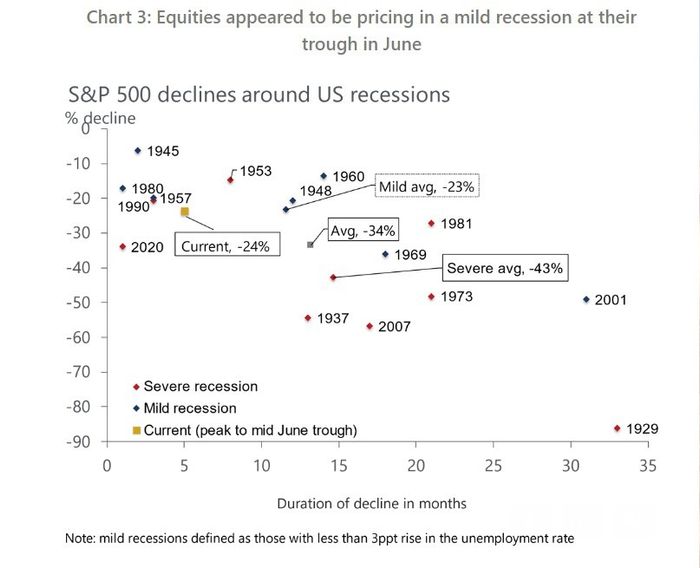If the U.S. slips into a recession, what would it likely cost the stock market?
That’s a key question on the minds of investors as the Federal Reserve works to dramatically raise interest rates in a bid to stamp out painfully high levels of inflation, a quest Fed Chairman Jerome Powell warned in August could hurt households and businesses.
Analysts often point to this year’s rout in stocks as evidence that a recession already has been “priced in,” frequently without pinpointing what that entails.
To help put some meat on the bone, Oxford Economics compiled historical data and found that the S&P 500 index’s SPX, +0.34% roughly 24% decline (see chart), from its peak to mid-June trough, looks in line with “mild” U.S. recessions over the past 15 years.
Of those, the average stock-market drop was 34%, while severe downturns, like the ones in 1973 and 2001, produced an average decline of about 43%.

Stocks fell 34% on average in recent U.S. recessions.
Oxford Economics, Refinitiv, Bloomberg
“Of course, equities have already gone some way to pricing in a recession, and we think that this should limit the extent of further losses,” Daniel Grosvenor, director of global equity strategy at Oxford Economics, wrote in a Wednesday note.
His team expects to see a mild recession this time around, characterized as resulting in a less-than-3 percentage-point rise in the unemployment rate. The jobless rate was pegged at 3.75% in August, the highest in six months, but still the tightest labor market in modern times.
See: JPMorgan exec sees roughly 50% chance of ‘mild’ recession and eyes chance to hire laid-off bankers
“Everyone can cherry-pick the data to confirm their prior beliefs, and investors are left ‘in the waiting place,’ wondering if the recession is ongoing, already past, or in the future,” said Vincent Deluard, global macro strategist at StoneX, in a client note.
While healthcare has been the best-performing sector in past recessions, he thinks energy CL00, +0.68% and cyclical sectors should outperform in the next one.
“Conversely, utilities and bond proxies will fare poorly as inflation and rates will remain elevated throughout the next recession,” Deluard said.
U.S. stocks eked out gains Wednesday, after the S&P 500, Nasdaq Composite Index COMP, +0.74% and Dow Jones Industrial Average DJIA, +0.10% on Tuesday booked their worst daily percentage drops since June 2020.















Add Comment